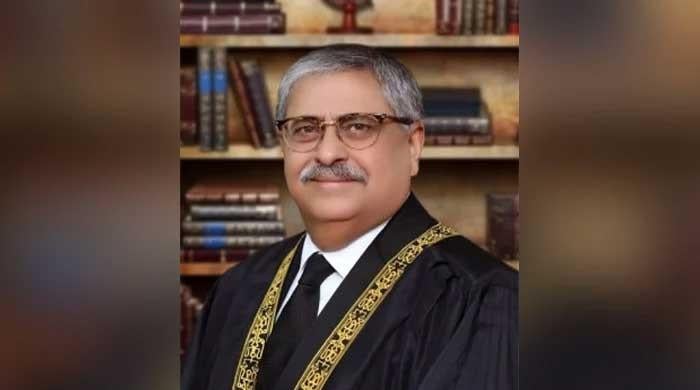ISLAMABAD: Supreme Court’s Justice Athar Minallah on Saturday said that apparently the apex court verdict in the Pakistan Tehreek-e-Insaf (PTI) electoral symbol case was misunderstood by the Election Commission of Pakistan (ECP) as it did not seek to bar the political party from participating in the polls.
“Prima facie, the interpretation was flawed and the judgment could not have been construed as having the effect of disqualifying a major political party from the general elections,” the Supreme Court judge wrote in an additional note in the reserved seats case being heard by a full court led by Chief Justice of Pakistan (CJP) Qazi Faez Isa.
Led by the CJP, the full court bench comprises Justice Syed Mansoor Ali Shah, Justice Muneeb Akhtar, Justice Yahya Afridi, Justice Amin-ud-Din Khan, Justice Jamal Khan Mandokhail, Justice Muhammad Ali Mazhar, Justice Malik, Justice Minallah, Justice Syed Hassan Azhar Rizvi, Justice Shahid Waheed, Justice Irfan Saadat Khan and Justice Naeem Akhtar Afghan.
In the note, Justice Minallah stated that the ECP’s decision denied voters their fundamental rights and misinterpreted the Supreme Court’s ruling.
Integrity of polls
“The arguments advanced today by the counsel on behalf of the ECP have raised profound questions of public importance…,” the jurist said adding that these questions were rooted in the legitimacy of the electoral process.
According to Justice Minallah, the ECP counsel has unequivocally argued that one of the major enlisted political parties was purportedly disqualified from the competitive electoral process based on the the the electoral body’s interpretation of the judgment of the top court.
“The exclusion of a major political party from the general elections by the Commission, on the basis of its flawed interpretation of the judgment of this Court, definitely has the consequence of the disenfranchisement of voters and thus deprivation of the reserved seats.”
He further writes that the legitimacy of governance, future policies, legislation and public trust in the representative institutions exclusively depends on the integrity of the electoral process and the electoral institutions.
‘Buck stops with ECP’
“The buck stops with the Commission. The onus is on the Commission to satisfy this Court that a major political party was justifiably excluded from the political and electoral process and that conditions were not created for depriving it of the legitimate right to claim its share of reserved seats.”
“The failure of the Commission to discharge this onus would definitely raise grave questions regarding the fulfilment of the constitutional duty to conduct elections in accordance with the mandate of the Constitution,” the apex court judge wrote in the note.
He added that petitions were pending before the apex court raising questions regarding the integrity of the electoral process during the general elections and the alleged violations of fundamental rights of the voters and political workers.
Elephant in the room
“This court cannot turn a blind eye by ignoring the grave allegations regarding the integrity of the electoral process as doing so would have profound consequences regarding the matter in hand.
“This Court cannot and must not be seen as ignoring the elephant in the room. It cannot be perceived as being complicit in the alleged failures of the Commission to conduct genuine and credible elections as mandated under the Constitution,” he said.
During Thursday’s hearing, Minallah remarked that the ECP had no authority to prevent any party from partaking in elections.
“Election Commission does not have the authority to exclude any political party from [taking part in] elections,” Justice Minallah said.
Reserved seats saga
The whole reserved seats saga began after the PTI-backed independent candidates emerged victorious in the February 8 elections and subsequently joined the SIC in a bid to claim seats reserved for minorities and women.
The move, however, didn’t prove to go in the party’s favour as the ECP, citing its failure to submit its list of candidates, denied allocating the reserved seats to the SIC.
The party then approached the PHC which upheld the electoral body’s decision on the matter.
Subsequently, the SIC moved the SC seeking to set aside the PHC verdict and the allocation of 67 women and 11 minority seats in the assemblies.
On May 6, a three-member SC bench headed by Justice Mansoor Ali Shah, including Justice Muhammad Ali Mazhar and Justice Minallah, suspended the PHC verdict.
It then referred the matter to the judges’ committee for the formation of a larger bench since the matter required constitutional interpretation.
Meanwhile, the ECP had last week submitted its response to the apex court, saying the SIC does not qualify for reserved seats as the political party doesn’t allow non-Muslims to be a part of it.
The ECP informed the top court that the reserved seats cannot be allotted to the SIC as the party did not submit the list of candidates before the January 24 deadline.
The whole reserved seats issue holds significance as the PTI-backed independent candidates, who make up the majority of the opposition benches, lost as many as 77 reserved seats in NA and provincial assemblies due to the PHC’s verdict.

